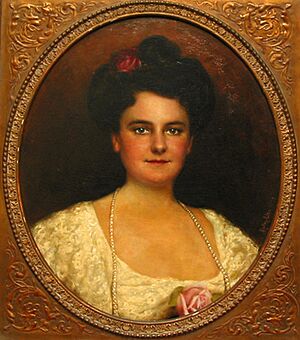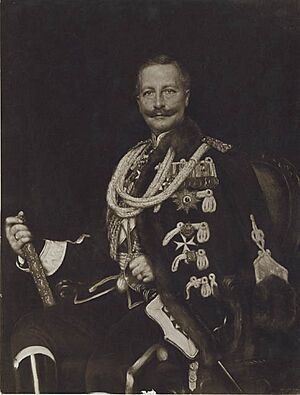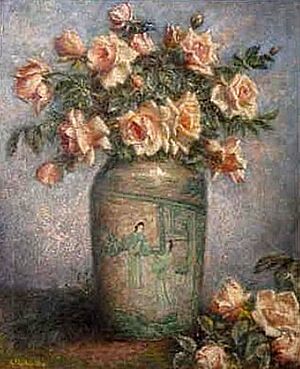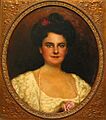Adolfo Müller-Ury facts for kids
Quick facts for kids
Adolfo Müller-Ury
KSG
|
|
|---|---|
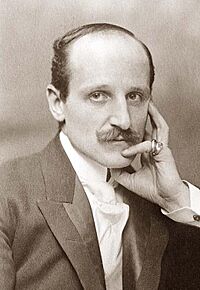
Müller-Ury, c. 1900
|
|
| Born |
Felice Adolfo Müller
March 29, 1862 Airolo, Switzerland
|
| Died | July 6, 1947 (aged 85) Lenox Hill Hospital
New York City, U.S. |
| Resting place | New Calvary Cemetery Queens, New York City, U.S. |
| Nationality | Swiss |
| Alma mater | Munich Academy |
| Style | Oil painting portraiture and impressionistic |
Adolfo Müller-Ury (born March 29, 1862 – died July 6, 1947) was a talented artist. He was born in Switzerland but became an American portrait painter. He was also known for his beautiful paintings of roses and still life scenes.
Contents
Early Life and Art Training
Adolfo Müller-Ury was born in Airolo, Switzerland, in 1862. His family was well-known and included lawyers and business people. He was one of 19 children!
Adolfo showed artistic talent early on. A sculptor named Vincenzo Vela encouraged him to study painting. He first learned from a local painter of religious art, Melchior Paul von Deschwanden.
In 1881, Adolfo went to the Academy of Fine Arts, Munich in Germany. He studied there for about 18 months. After that, he spent two years in Rome, Italy. He copied famous old paintings to learn from the masters.
His early artworks were quite varied. They included religious pictures, academic drawings, and copies of old paintings. He also painted landscapes and everyday scenes. Many of these early works are still in his family's old home in Switzerland.
Becoming a Famous Painter
In late 1884, Müller-Ury decided to visit the United States. He traveled to cities like Milwaukee, Chicago, and St. Paul. Soon, his skill at painting portraits was noticed.
One of his first important clients was James J. Hill. Hill was a railroad builder who commissioned many paintings. Müller-Ury painted Hill, his family, and his business partners.
He also painted a portrait of a little girl named Miss Brandeis. This was likely his first commissioned painting in America. Around this time, he started changing how he signed his art. By 1890, he used "A. Muller-Ury," which became his well-known name.
From 1885 to 1904, his main studio was in New York City. It was in the Sherwood Studio Building. Many other artists also had studios there. He was known for painting important people in New York society. People even called him the "Painter to the Four Hundred." This meant he painted the most elite and famous people.
He often traveled between New York and Europe. In the late 1890s, he had a studio in London. He painted British lords who were business partners of James J. Hill. In 1904, he moved into a new studio in the Atelier Building in New York. He stayed there until he passed away.
Painting Important People
Müller-Ury became famous for painting many important figures. He painted leaders, religious figures, and celebrities.
Political Leaders
- Emperor William II of Germany (1909)
- President William McKinley (1899, 1900)
- General Ulysses S. Grant (1897)
- Theodore Roosevelt
- Edith Galt (Mrs. Woodrow Wilson) (1916)
- President Wilson (1917)
He also painted several Swiss politicians who became presidents of Switzerland. One notable portrait was of Dr. Charles Daniel Bourcart, the Swiss Minister in London.
Religious Leaders
Müller-Ury painted many important Roman Catholic leaders.
- Pope Pius X (1907, 1908, 1911)
- Cardinal Rafael Merry del Val (1907)
- Cardinal Désiré-Joseph Mercier
- Pope Benedict XV (1920)
- Pope Pius XI (1923, 1930) – For these portraits, he received special honors from the Pope.
- Cardinal Patrick Joseph Hayes (1924)
- Pope Pius XII (1936, 1939)
Famous Performers
He also painted many well-known opera singers and actresses.
- Emma Calvé (opera singer)
- Lina Cavalieri (opera singer) (1907)
- Dame Nellie Melba (opera singer) (1908)
- Lillian Russell (actress) (1902)
- Margaret Illington (actress) (1906)
Other Notable People
Müller-Ury painted many other important people of his time. These included:
- Benjamin Altman, a department store owner and art collector.
- James J. Hill, the railroad builder, many times.
- J. Pierpont Morgan, a very powerful banker.
- Jessica Dragonette, a famous radio soprano, several times in his later years.
Painting Roses and Still Lifes
Besides portraits, Müller-Ury was also admired for his paintings of roses and still lifes. A still life is a painting of objects that don't move, like flowers or fruit.
He started painting still lifes before 1896. After 1918, his still life paintings became more impressionistic. This means they used loose brushstrokes and focused on light and color. He often painted roses in Chinese vases. These vases were from the collection of J. Pierpont Morgan.
He was a fan of Claude Monet, a famous Impressionist painter. Müller-Ury believed Impressionists helped "awaken modern art." He painted many types of roses, like American Beauty and La France. Many of his rose paintings were done when he lived in California.
Time in California
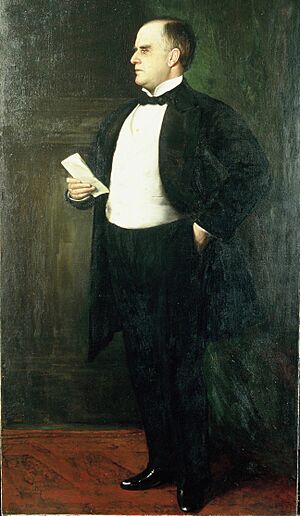
In 1922, Müller-Ury visited California for the first time. He liked it so much that he decided to build a studio there. His studio was in San Marino, California. It was built in a Spanish style with a large north-facing window. This window was perfect for painting because it let in steady, natural light.
He planted many varieties of roses in his studio gardens. He used these roses in his still life paintings. While in San Marino, he painted portraits of several important people. These included Henry Mauris Robinson, a diplomat, and Anita Baldwin.
He left his California studio for the last time in 1933. The house was later used by the Red Cross during World War II.
Later Years and Passing
After his time in California, Müller-Ury returned to his New York studio. He continued to paint important figures. In 1938, he painted a large portrait of President Motta of Switzerland. He also painted Pope Pius XII in 1936.
In his final years, he painted his friend Cardinal Francis Spellman of New York. He also painted the famous radio singer Jessica Dragonette several times. His last portrait of her was in 1946.
Adolfo Müller-Ury passed away on July 6, 1947, at the age of 85. He is buried in New Calvary Cemetery in Queens, New York. His gravestone simply says "ADOLPH MULLER-URY 1862–1947."
After his death, many of his artworks were sold. Today, his paintings can be found in museums and private collections around the world.
Exhibitions
Müller-Ury's paintings were shown in many art exhibitions. Here are some of the places where his work was displayed:
- 1884, Schweizerisches Kunstaustellung, Berne, Switzerland.
- 1886, Schaus's Art Gallery, New York.
- 1889, Exposition Universelle, Paris, France.
- 1894, M. Knoedler & Co., New York.
- 1894, The Corcoran Gallery of Art, Washington D.C.
- 1897, Durand-Ruel Galleries, New York (a solo show).
- 1900, Exposition Universelle, Paris, U.S. Pavilion.
- 1901, Pan-American Exposition, Buffalo, New York.
- 1908, The Corcoran Gallery of Art, Washington D.C. (a solo show).
- 1925, Duveen Galleries, New York (a solo show).
- 1937, Wildenstein & Co., Inc., New York (a solo show).
- 1947, French & Company, New York (a solo show).
Collections
Müller-Ury's art is held in several public collections.
- The Historisches Museum von Uri in Altdorf, Switzerland, has ten of his paintings. These include a large artwork called Alpenrose und Edelweiss.
- The Preservation Society of Newport County, Rhode Island, has several of his portraits and etchings. Many of these were given to them from the collection of the soprano Jessica Dragonette.
- The National Portrait Gallery in Washington D.C. has nine of his portraits. These include paintings of President William McKinley and General Henry Clarke Corbin. It also has a self-portrait and a portrait of steel industrialist Charles M. Schwab.
Many of his works are still owned by private collectors or the families of the people he painted. His 1923 portrait of his friend, the art dealer Sir Joseph Duveen, was recently rediscovered and is now well-known.
Hildegarde Muller-Uri
Hildegarde Muller-Uri (1894–1990) was an American artist. She was a distant relative of Adolfo Müller-Ury. She was born in New York City.
Hildegarde studied art at several schools, including the Pennsylvania Academy of the Fine Arts. She founded the Galleon Art School in San Augustine in 1925. Later, she started the San Augustine Arts Club in 1931. She was a skilled art administrator and created many of her own artworks.
Her art included stained glass, etchings, and woodblock prints. She often depicted city scenes and historic buildings in Florida. She even worked on a book called St. Augustine in Woodcuts. Hildegarde Muller-Uri passed away in 1990.
Images for kids
-
President William McKinley
See Also
- List of Swiss painters
- List of American painters
 | Ernest Everett Just |
 | Mary Jackson |
 | Emmett Chappelle |
 | Marie Maynard Daly |


